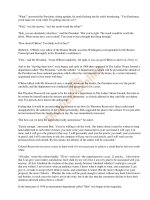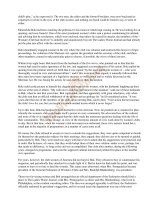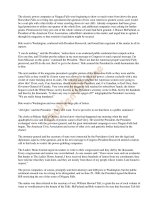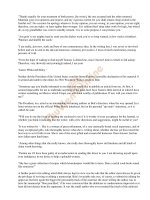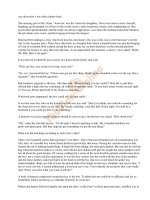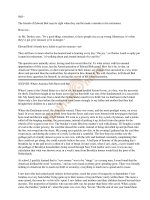Tài liệu The Americanization of Edward Bok 5 ppt
Bạn đang xem bản rút gọn của tài liệu. Xem và tải ngay bản đầy đủ của tài liệu tại đây (166.74 KB, 10 trang )
"Let me go down-stairs," Edward interrupted.
"No; you stay right here," said Mr. Beecher.
"Why, Mr. Beecher! How can we? Isn't Edward with you?"
"You are keeping me waiting for you," was the quiet and firm answer.
There was a moment's hesitation. Then the door opened and the figures of the two girls appeared.
"Now, turn up the gas, please, as it was," said Mr. Beecher.
"But, Mr. Beecher "
"You heard me?"
Up went the light, and the two beautiful girls of the box stood in their night-dresses.
"Now, why did you run away?" asked Mr. Beecher.
"Why, Mr. Beecher! How can you ask such a question?" pouted one of the girls, looking at her dress and then
at Edward.
"Exactly," said Mr. Beecher. "Your modesty leads you to run away from this young man because he might
possibly see you under a single light in dresses that cover your entire bodies, while that same modesty did not
prevent you all this evening from sitting beside him, under a myriad of lights, in dresses that exposed nearly
half of your bodies. That's what I call a distinction with a difference with the difference to the credit neither
of your intelligence nor of your modesty. There is some modesty in the dresses you have on: there was
precious little in what you girls wore this evening. Good night."
"You do not believe, Mr. Beecher," Edward asked later, "in decollete dressing for girls?"
"No, and even less for women. A girl has some excuse of youth on her side; a woman none at all."
A few moments later he added:
"A proper dress for any girl or woman is one that reveals the lady, but not her person."
Edward asked Mrs. Beecher one day whether Mr. Beecher had ever expressed an opinion of his sister's
famous book, Uncle Tom's Cabin, and she told this interesting story of how the famous preacher read the
story:
"When the story was first published in The National Era, in chapters, all our family, excepting Mr. Beecher,
looked impatiently for its appearance each week. But, try as we might, we could not persuade Mr. Beecher to
read it, or let us tell him anything about it.
"'It's folly for you to be kept in constant excitement week after week,' he would say. 'I shall wait till the work
is completed, and take it all at one dose.'
"After the serial ended, the book came to Mr. Beecher on the morning of a day when he had a meeting on
hand for the afternoon and a speech to make in the evening. The book was quietly laid one side, for he always
scrupulously avoided everything that could interfere with work he was expected to do. But the next day was a
The Legal Small Print 46
free day. Mr. Beecher rose even earlier than usual, and as soon as he was dressed he began to read Uncle
Tom's Cabin. When breakfast was ready he took his book with him to the table, where reading and eating
went on together; but he spoke never a word. After morning prayers, he threw himself on the sofa, forgot
everything but his book, and read uninterruptedly till dinner-time. Though evidently intensely interested, for a
long time he controlled any marked indication of it. Before noon I knew the storm was gathering that would
conquer his self-control, as it had done with us all. He frequently 'gave way to his pocket-handkerchief,' to use
one of his old humorous remarks, in a most vigorous manner. In return for his teasing me for reading the work
weekly, I could not refrain from saying demurely, as I passed him once: 'You seem to have a severe cold,
Henry. How could you have taken it?' But what did I gain? Not even a half-annoyed shake of the head, or the
semblance of a smile. I might as well have spoken to the Sphinx.
"When reminded that the dinner-bell had rung, he rose and went to the table, still with his book in his hand.
He asked the blessing with a tremor in his voice, which showed the intense excitement under which he was
laboring. We were alone at the table, and there was nothing to distract his thoughts. He drank his coffee, ate
but little, and returned to his reading, with no thought of indulging in his usual nap. His almost uncontrollable
excitement revealed itself in frequent half-suppressed sobs.
"Mr. Beecher was a very slow reader. I was getting uneasy over the marks of strong feeling and excitement,
and longed to have him finish the book. I could see that he entered into the whole story, every scene, as if it
were being acted right before him, and he himself were the sufferer. He had always been a pronounced
Abolitionist, and the story he was reading roused intensely all he had felt on that subject.
"The night came on. It was growing late, and I felt impelled to urge him to retire. Without raising his eyes
from the book, he replied:
"'Soon; soon; you go; I'll come soon.'
"Closing the house, I went to our room; but not to sleep. The clock struck twelve, one, two, three; and then, to
my great relief, I heard Mr. Beecher coming up-stairs. As he entered, he threw Uncle Tom's Cabin on the
table, exclaiming: 'There; I've done it! But if Hattie Stowe ever writes anything more like that I'll well! She
has nearly killed me.'
"And he never picked up the book from that day."
Any one who knew Henry Ward Beecher at all knew of his love of books. He was, however, most prodigal in
lending his books and he always forgot the borrowers. Then when he wanted a certain volume from his library
he could not find it. He would, of course, have forgotten the borrower, but he had a unique method of tracing
the book.
One evening the great preacher suddenly appeared at a friend's house and, quietly entering the drawing-room
without removing his overcoat, he walked up to his friend and said:
"Rossiter, why don't you bring back that Ruskin of mine that I lent you?"
The man colored to the roots of his hair. "Why, Mr. Beecher," he said, "I'll go up-stairs and get it for you right
away. I would not have kept it so long, only you told me I might."
At this Beecher burst into a fit of merry laughter. "Found! Found!" he shouted, as he took off his overcoat and
threw himself into a chair.
When he could stop laughing, he said: "You know, Rossiter, that I am always ready to lend my books to any
one who will make good use of them and bring them back, but I always forget to whom I lend them. It
The Legal Small Print 47
happened, in this case, that I wanted that volume of Ruskin about a week ago; but when I went to the shelf for
it, it was gone. I knew I must have lent it, but to whom I could not remember. During the past week, I began
to demand the book of every friend I met to whom I might have lent it. Of course, every one of them protested
innocence; but at last I've struck the guilty man. I shall know, in future, how to find my missing books. The
plan works beautifully."
One evening, after supper, Mr. Beecher said to his wife:
"Mother, what material have we among our papers about our early Indiana days?"
Mr. Beecher had long been importuned to write his autobiography, and he had decided to do it after he had
finished his Life of Christ.
Mrs. Beecher had two boxes brought into the room.
"Suppose you look into that box, if you will," said Mr. Beecher to Edward, "and I'll take this one, and we'll
see what we can find about that time. Mother, you supervise and see how we look on the floor."
And Mr. Beecher sat down on the floor in front of one box, shoemaker-fashion, while Edward, likewise on the
floor, started on the other box.
It was a dusty job, and the little room began to be filled with particles of dust which set Mrs. Beecher
coughing. At last she said: "I'll leave you two to finish. I have some things to do up-stairs, and then I'll retire.
Don't be too late, Henry," she said.
It was one of those rare evenings for Mr. Beecher absolutely free from interruption; and, with his memory
constantly taken back to his early days, he continued in a reminiscent mood that was charmingly intimate to
the boy.
"Found something?" he asked at one intermission when quiet had reigned longer than usual, and he saw
Edward studying a huge pile of papers.
"No, sir," said the boy. "Only a lot of papers about a suit."
"What suit?" asked Mr. Beecher mechanically, with his head buried in his box.
"I don't know, sir," Edward replied naively, little knowing what he was reopening to the preacher. "'Tilton
versus Beecher' they are marked."
Mr. Beecher said nothing, and after the boy had fingered the papers he chanced to look in the preacher's
direction and found him watching him intently with a curiously serious look in his face.
"Must have been a big suit," commented the boy. "Here's another pile of papers about it."
Edward could not make out Mr. Beecher's steady look at him as he sat there on the floor mechanically playing
with a paper in his hand.
"Yes," he finally said, "it was a big suit. What does it mean to you?" he asked suddenly.
"To me?" Edward asked. "Nothing, sir. Why?"
Mr. Beecher said nothing for a few moments, and turned to his box to examine some more papers.
The Legal Small Print 48
Then the boy asked: "Was the Beecher in this suit you, Mr. Beecher?"
Again was turned on him that serious, questioning look.
"Yes," he said after a bit. Then he thought again for a few moments and said: "How old were you in 1875?"
"Twelve," the boy replied.
"Twelve," he repeated. "Twelve."
He turned again to his box and Edward to his.
"There doesn't seem to be anything more in this box," the boy said, "but more papers in that suit," and he
began to put the papers back.
"What do you know about that 'suit,' as you call it?" asked Mr. Beecher, stopping in his work.
"Nothing," was the reply. "I never heard of it."
"Never heard of it?" he repeated, and he fastened that curious look upon Edward again. It was so compelling
that it held the boy. For several moments they looked at each other. Neither spoke.
"That seems strange," he said, at last, as he renewed the search of his box. "Never heard of it," he repeated
almost to himself.
Then for fully five minutes not a word was spoken.
"But you will some day," said Mr. Beecher suddenly.
"I will what, Mr. Beecher?" asked the boy. He had forgotten the previous remark.
Mr. Beecher looked at Edward and sighed. "Hear about it," he said.
"I don't think I understand you," was the reply.
"No, I don't think you do," he said. "I mean, you will some day hear about that suit. And I don't know," then
he hesitated, "but but you might as well get it straight. You say you were twelve then," he mused. "What
were you doing when you were twelve?"
"Going to school," was the reply.
"Yes, of course," said Mr. Beecher. "Well," he continued, turning on his haunches so that his back rested
against the box, "I am going to tell you the story of that suit, and then you'll know it."
Edward said nothing, and then began the recital of a story that he was destined to remember. It was interesting
then, as Mr. Beecher progressed; but how thrice interesting that wonderful recital was to prove as the years
rolled by and the boy realized the wonderful telling of that of all stories by Mr. Beecher himself!
Slowly, and in that wonderfully low, mellow voice that so many knew and loved, step by step, came the
unfolding of that remarkable story. Once or twice only did the voice halt, as when, after he had explained the
basis of the famous suit, he said:
The Legal Small Print 49
"Those were the charges. That is what it was all about."
Then he looked at Edward and asked: "Do you know just what such charges mean?"
"I think I do," Edward replied, and the question was asked with such feeling, and the answer was said so
mechanically, that Mr. Beecher replied simply: "Perhaps."
"Well," he continued, "the suit was a 'long one,' as you said. For days and weeks, yes, for months, it went on,
from January to July, and those were very full days: full of so many things that you would hardly understand."
And then he told the boy as much of the days in court as he thought he would understand, and how the
lawyers worked and worked, in court all day, and up half the night, preparing for the next day. "Mostly around
that little table there," he said, pointing to a white, marble-topped table against which the boy was leaning, and
which now stands in Edward Bok's study.
"Finally the end came," he said, "after well, months. To some it seemed years," said Mr. Beecher, and his
eyes looked tired.
"Well," he continued, "the case went to the jury: the men, you know, who had to decide. There were twelve of
them."
"Was it necessary that all twelve should think alike?" asked the boy.
"That was what was hoped, my boy," said Mr. Beecher "that was what was hoped," he repeated.
"Well, they did, didn't they?" Edward asked, as Mr. Beecher stopped.
"Nine did," he replied. "Yes; nine did. But three didn't. Three thought " Mr. Beecher stopped and did not
finish the sentence. "But nine did," he repeated. "Nine to three it stood. That was the decision, and then the
judge discharged the jury," he said.
There was naturally one question in the boyish mind to ask the man before him one question! Yet,
instinctively, something within him made him hesitate to ask that question. But at last his curiosity got the
better of the still, small voice of judgment.
"And, Mr. Beecher " the boy began.
But Mr. Beecher knew! He knew what was at the end of the tongue, looked clear into the boy's mind; and
Edward can still see him lift that fine head and look into his eyes, as he said, slowly and clearly:
"And the decision of the nine was in exact accord with the facts."
He had divined the question!
As the two rose from the floor that night Edward looked at the clock. It was past midnight; Mr. Beecher had
talked for two hours; the boy had spoken hardly at all.
As the boy was going out, he turned to Mr. Beecher sitting thoughtfully in his chair.
"Good night, Mr. Beecher," he said.
The Plymouth pastor pulled himself together, and with that wit that never forsook him he looked at the clock,
The Legal Small Print 50
smiled, and answered: "Good morning, I should say. God bless you, my boy." Then rising, he put his arm
around the boy's shoulders and walked with him to the door.
X. The First "Woman's Page," "Literary Leaves," and Entering Scribner's
Mr. Beecher's weekly newspaper "syndicate" letter was not only successful in itself, it made liberal money for
the writer and for its two young publishers, but it served to introduce Edward Bok's proposed agency to the
newspapers under the most favorable conditions. With one stroke, the attention of newspaper editors had been
attracted, and Edward concluded to take quick advantage of it. He organized the Bok Syndicate Press, with
offices in New York, and his brother, William J. Bok, as partner and active manager. Edward's days were
occupied, of course, with his duties in the Holt publishing house, where he was acquiring a first-hand
knowledge of the business.
Edward's attention was now turned, for the first time, to women and their reading habits. He became
interested in the fact that the American woman was not a newspaper reader. He tried to find out the
psychology of this, and finally reached the conclusion, on looking over the newspapers, that the absence of
any distinctive material for women was a factor. He talked the matter over with several prominent New York
editors, who frankly acknowledged that they would like nothing better than to interest women, and make them
readers of their papers. But they were equally frank in confessing that they were ignorant both of what women
wanted, and, even if they knew, of where such material was to be had. Edward at once saw that here was an
open field. It was a productive field, since, as woman was the purchasing power, it would benefit the
newspaper enormously in its advertising if it could offer a feminine clientele.
There was a bright letter of New York gossip published in the New York Star, called "Bab's Babble." Edward
had read it, and saw the possibility of syndicating this item as a woman's letter from New York. He
instinctively realized that women all over the country would read it. He sought out the author, made
arrangements with her and with former Governor Dorscheimer, owner of the paper, and the letter was sent out
to a group of papers. It was an instantaneous success, and a syndicate of ninety newspapers was quickly
organized.
Edward followed this up by engaging Ella Wheeler Wilcox, then at the height of her career, to write a weekly
letter on women's topics. This he syndicated in conjunction with the other letter, and the editors invariably
grouped the two letters. This, in turn, naturally led to the idea of supplying an entire page of matter of interest
to women. The plan was proposed to a number of editors, who at once saw the possibilities in it and promised
support. The young syndicator now laid under contribution all the famous women writers of the day; he chose
the best of the men writers to write on women's topics; and it was not long before the syndicate was supplying
a page of women's material. The newspapers played up the innovation, and thus was introduced into the
newspaper press of the United States the "Woman's Page."
The material supplied by the Bok Syndicate Press was of the best; the standard was kept high; the writers
were selected from among the most popular authors of the day; and readability was the cardinal note. The
women bought the newspapers containing the new page, the advertiser began to feel the presence of the new
reader, and every newspaper that could not get the rights for the "Bok Page," as it came to be known, started a
"Woman's Page" of it own. Naturally, the material so obtained was of an inferior character. No single
newspaper could afford what the syndicate, with the expense divided among a hundred newspapers, could
pay. Nor had the editors of these woman's pages either a standard or a policy. In desperation they engaged any
person they could to "get a lot of woman's stuff." It was stuff, and of the trashiest kind. So that almost
coincident with the birth of the idea began its abuse and disintegration; the result we see in the meaningless
presentations which pass for "woman's pages" in the newspaper of to-day.
This is true even of the woman's material in the leading newspapers, and the reason is not difficult to find. The
average editor has, as a rule, no time to study the changing conditions of women's interests; his time is and
The Legal Small Print 51
must be engrossed by the news and editorial pages. He usually delegates the Sunday "specials" to some editor
who, again, has little time to study the ever-changing women's problems, particularly in these days, and he
relies upon unintelligent advice, or he places his "woman's page" in the hands of some woman with the
comfortable assurance that, being a woman, she ought to know what interests her sex.
But having given the subject little thought, he attaches minor importance to the woman's "stuff," regarding it
rather in the light of something that he "must carry to catch the women"; and forthwith he either forgets it or
refuses to give the editor of his woman's page even a reasonable allowance to spend on her material. The
result is, of course, inevitable: pages of worthless material. There is, in fact, no part of the Sunday newspaper
of to-day upon which so much good and now expensive white paper is wasted as upon the pages marked for
the home, for women, and for children.
Edward Bok now became convinced, from his book-publishing association, that if the American women were
not reading the newspapers, the American public, as a whole, was not reading the number of books that it
should, considering the intelligence and wealth of the people, and the cheap prices at which books were sold.
He concluded to see whether he could not induce the newspapers to give larger and more prominent space to
the news of the book world.
Owing to his constant contact with authors, he was in a peculiarly fortunate position to know their plans in
advance of execution, and he was beginning to learn the ins and outs of the book-publishing world. He
canvassed the newspapers subscribing to his syndicate features, but found a disinclination to give space to
literary news. To the average editor, purely literary features held less of an appeal than did the features for
women. Fewer persons were interested in books, they declared; besides, the publishing houses were not so
liberal advertisers as the department stores. The whole question rested on a commercial basis.
Edward believed he could convince editors of the public interest in a newsy, readable New York literary
letter, and he prevailed upon the editor of the New York Star to allow him to supplement the book reviews of
George Parsons Lathrop in that paper by a column of literary chat called "Literary Leaves." For a number of
weeks he continued to write this department, and confine it to the New York paper, feeling that he needed the
experience for the acquirement of a readable style, and he wanted to be sure that he had opened a sufficient
number of productive news channels to ensure a continuous flow of readable literary information.
Occasionally he sent to an editor here and there what he thought was a particularly newsy letter just "for his
information, not for sale." The editor of the Philadelphia Times was the first to discover that his paper wanted
the letter, and the Boston Journal followed suit. Then the editor of the Cincinnati Times-Star discovered the
letter in the New York Star, and asked that it be supplied weekly with the letter. These newspapers renamed
the letter "Bok's Literary Leaves," and the feature started on its successful career.
Edward had been in the employ of Henry Holt and Company as clerk and stenographer for two years when
Mr. Cary sent for him and told him that there was an opening in the publishing house of Charles Scribner's
Sons, if he wanted to make a change. Edward saw at once the larger opportunities possible in a house of the
importance of the Scribners, and he immediately placed himself in communication with Mr. Charles Scribner,
with the result that in January, 1884, he entered the employ of these publishers as stenographer to the two
members of the firm and to Mr. Edward L. Burlingame, literary adviser to the house. He was to receive a
salary of eighteen dollars and thirty-three cents per week, which was then considered a fair wage for
stenographic work. The typewriter had at that time not come into use, and all letters were written in
long-hand. Once more his legible handwriting had secured for him a position.
Edward Bok was now twenty-one years of age. He had already done a prodigious amount of work for a boy of
his years. He was always busy. Every spare moment of his evenings was devoted either to writing his literary
letter, to the arrangement or editing of articles for his newspaper syndicate, to the steady acquirement of
autograph letters in which he still persisted, or to helping Mr. Beecher in his literary work. The Plymouth
The Legal Small Print 52
pastor was particularly pleased with Edward's successful exploitation of his pen work; and he afterward wrote:
"Bok is the only man who ever seemed to make my literary work go and get money out of it."
Enterprise and energy the boy unquestionably possessed, but one need only think back even thus far in his life
to see the continuous good fortune which had followed him in the friendships he had made, and in the men
with whom his life, at its most formative period, had come into close contact. If we are inclined to credit
young Bok with an ever-willingness to work and a certain quality of initiative, the influences which played
upon him must also be taken into account.
Take, for example, the peculiarly fortuitous circumstances under which he entered the Scribner publishing
house. As stenographer to the two members of the firm, Bok was immediately brought into touch with the
leading authors of the day, their works as they were discussed in the correspondence dictated to him, and the
authors' terms upon which books were published. In fact, he was given as close an insight as it was possible
for a young man to get into the inner workings of one of the large publishing houses in the United States, with
a list peculiarly noted for the distinction of its authors and the broad scope of its books.
The Scribners had the foremost theological list of all the publishing houses; its educational list was
exceptionally strong; its musical list excelled; its fiction represented the leading writers of the day; its general
list was particularly noteworthy; and its foreign department, importing the leading books brought out in Great
Britain and Europe, was an outstanding feature of the business. The correspondence dictated to Bok covered,
naturally, all these fields, and a more remarkable opportunity for self-education was never offered a
stenographer.
Mr. Burlingame was known in the publishing world for his singularly keen literary appreciation, and was
accepted as one of the best judges of good fiction. Bok entered the Scribner employ as Mr. Burlingame was
selecting the best short stories published within a decade for a set of books to be called "Short Stories by
American Authors." The correspondence for this series was dictated to Bok, and he decided to read after Mr.
Burlingame and thus get an idea of the best fiction of the day. So whenever his chief wrote to an author asking
for permission to include his story in the proposed series, Bok immediately hunted up the story and read it.
Later, when the house decided to start Scribner's Magazine, and Mr. Burlingame was selected to be its editor,
all the preliminary correspondence was dictated to Bok through his employers, and he received a firsthand
education in the setting up of the machinery necessary for the publication of a magazine. All this he eagerly
absorbed.
He was again fortunate in that his desk was placed in the advertising department of the house; and here he
found, as manager, an old-time Brooklyn boy friend with whom he had gone to school: Frank N. Doubleday,
to-day the senior partner of Doubleday, Page and Company. Bok had been attracted to advertising through his
theatre programme and Brooklyn Magazine experience, and here was presented a chance to learn the art at
first hand and according to the best traditions. So, whenever his stenographic work permitted, he assisted Mr.
Doubleday in preparing and placing the advertisements of the books of the house.
Mr. Doubleday was just reviving the publication of a house-organ called The Book Buyer, and, given a
chance to help in this, Bok felt he was getting back into the periodical field, especially since, under Mr.
Doubleday's guidance, the little monthly soon developed into a literary magazine of very respectable size and
generally bookish contents.
The house also issued another periodical, The Presbyterian Review, a quarterly under the editorship of a board
of professors connected with the Princeton and Union Theological Seminaries. This ponderous-looking
magazine was not composed of what one might call "light reading," and as the price of a single copy was
eighty cents, and the advertisements it could reasonably expect were necessarily limited in number, the
periodical was rather difficult to move. Thus the whole situation at the Scribners' was adapted to give Edward
The Legal Small Print 53
an all-round training in the publishing business. It was an exceptional opportunity.
He worked early and late. An increase in his salary soon told him that he was satisfying his employers, and
then, when the new Scribner's Magazine appeared, and a little later Mr. Doubleday was delegated to take
charge of the business end of it, Bok himself was placed in charge of the advertising department, with the
publishing details of the two periodicals on his hands.
He suddenly found himself directing a stenographer instead of being a stenographer himself. Evidently his
apprentice days were over. He had, in addition, the charge of sending all the editorial copies of the new books
to the press for review, and of keeping a record of those reviews. This naturally brought to his desk the
authors of the house who wished to see how the press received their works.
The study of the writers who were interested in following the press notices of their books, and those who were
indifferent to them became a fascinating game to young Bok. He soon discovered that the greater the author
the less he seemed to care about his books once they were published. Bok noticed this, particularly, in the case
of Robert Louis Stevenson, whose work had attracted him, but, although he used the most subtle means to
inveigle the author into the office to read the press notices, he never succeeded. Stevenson never seemed to
have the slightest interest in what the press said of his books.
One day Mr. Burlingame asked Bok to take some proofs to Stevenson at his home; thinking it might be a
propitious moment to interest the author in the popular acclaim that followed the publication of Doctor Jekyll
and Mr. Hyde, Bok put a bunch of press notices in his pocket. He found the author in bed, smoking his
inevitable cigarette.
As the proofs were to be brought back, Bok waited, and thus had an opportunity for nearly two hours to see
the author at work. No man ever went over his proofs more carefully than did Stevenson; his corrections were
numerous; and sometimes for ten minutes at a time he would sit smoking and thinking over a single sentence,
which, when he had satisfactorily shaped it in his mind, he would recast on the proof.
Stevenson was not a prepossessing figure at these times. With his sallow skin and his black dishevelled hair,
with finger-nails which had been allowed to grow very long, with fingers discolored by tobacco in short, with
a general untidiness that was all his own, Stevenson, so Bok felt, was an author whom it was better to read
than to see. And yet his kindliness and gentleness more than offset the unattractiveness of his physical
appearance.
After one or two visits from Bok, having grown accustomed to him, Stevenson would discuss some sentence
in an article, or read some amended paragraph out loud and ask whether Bok thought it sounded better. To
pass upon Stevenson as a stylist was, of course, hardly within Bok's mental reach, so he kept discreetly silent
when Stevenson asked his opinion.
In fact, Bok reasoned it out that the novelist did not really expect an answer or an opinion, but was at such
times thinking aloud. The mental process, however, was immensely interesting, particularly when Stevenson
would ask Bok to hand him a book on words lying on an adjacent table. "So hard to find just the right word,"
Stevenson would say, and Bok got his first realization of the truth of the maxim: "Easy writing, hard reading;
hard writing, easy reading."
On this particular occasion when Stevenson finished, Bok pulled out his clippings, told the author how his
book was being received, and was selling, what the house was doing to advertise it, explained the forthcoming
play by Richard Mansfield, and then offered the press notices.
Stevenson took the bundle and held it in his hand.
The Legal Small Print 54
"That's very nice to tell me all you have," he said, "and I have been greatly interested. But you have really told
me all about it, haven't you, so why should I read these notices? Hadn't I better get busy on another paper for
Mr. Burlingame for the next magazine, else he'll be after me? You know how impatient these editors are."
And he handed back the notices.
Bok saw it was of no use: Stevenson was interested in his work, but, beyond a certain point, not in the world's
reception of it. Bok's estimate of the author rose immeasurably. His attitude was in such sharp contrast to that
of others who came almost daily into the office to see what the papers said, often causing discomfiture to the
young advertising director by insisting upon taking the notices with them. But Bok always countered this
desire by reminding the author that, of course, in that case he could not quote from these desirable notices in
his advertisements of the book. And, invariably, the notices were left behind!
It now fell to the lot of the young advertiser to arouse the interest of the public in what were to be some of the
most widely read and best-known books of the day: Robert Louis Stevenson's Dr. Jekyll and Mr. Hyde;
Frances Hodgson Burnett's Little Lord Fauntleroy; Andrew Carnegie's Triumphant Democracy; Frank R.
Stockton's The Lady, or the Tiger? and his Rudder Grange, and a succession of other books.
The advertising of these books keenly sharpened the publicity sense of the developing advertising director.
One book could best be advertised by the conventional means of the display advertisement; another, like
Triumphant Democracy, was best served by sending out to the newspapers a "broadside" of pungent extracts;
public curiosity in a novel like The Lady, or the Tiger? was, of course, whetted by the publication of literary
notes as to the real denouement the author had in mind in writing the story. Whenever Mr. Stockton came into
the office Bok pumped him dry as to his experiences with the story, such as when, at a dinner party, his
hostess served an ice-cream lady and a tiger to the author, and the whole company watched which he chose.
"And which did you choose?" asked the advertising director.
"Et tu, Brute?" Stockton smilingly replied. "Well, I'll tell you. I asked the butler to bring me another spoon,
and then, with a spoon in each hand, I attacked both the lady and the tiger at the same time."
Once, when Stockton was going to Boston by the night boat, every room was taken. The ticket agent
recognized the author, and promised to get him a desirable room if the author would tell which he had had in
mind, the lady or the tiger.
"Produce the room," answered Stockton.
The man did. Stockton paid for it, and then said: "To tell you the truth, my friend, I don't know."
And that was the truth, as Mr. Stockton confessed to his friends. The idea of the story had fascinated him;
when he began it he purposed to give it a definite ending. But when he reached the end he didn't know himself
which to produce out of the open door, the lady or the tiger, "and so," he used to explain, "I made up my mind
to leave it hanging in the air."
To the present generation of readers, all this reference to Stockton's story may sound strange, but for months it
was the most talked-of story of the time, and sold into large numbers.
One day while Mr. Stockton was in Bok's office, A. B. Frost, the illustrator, came in. Frost had become a
full-fledged farmer with one hundred and twenty acres of Jersey land, and Stockton had a large farm in the
South which was a financial burden to him.
"Well, Stockton," said Frost, "I have found a way at last to make a farm stop eating up money. Perhaps it will
help you."
The Legal Small Print 55
